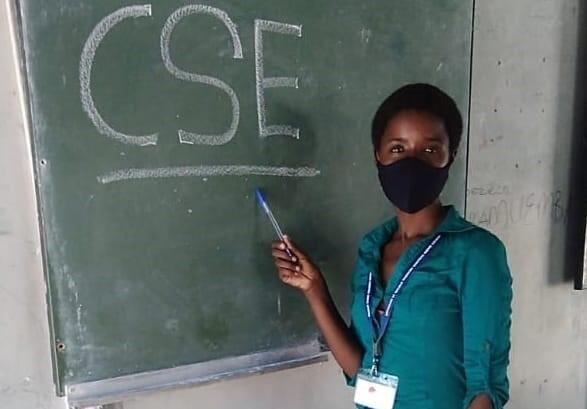GUMARE, Botswana- “Girls are still falling pregnant and are forced to drop out of school because they are not educated about sexual reproductive health early enough.”
Tshepo Bonang* fell pregnant in 2019 at 17 years old, becoming one of a growing number of adolescent girls in the Okavango districts who are forced to drop out of school because of unplanned pregnancies. She was forced to put her hopes of going back to school on hold as there was no one to help look after her daughter.
Reflecting on the challenges she faces as a young mother, Tshepo pleads for more to be done to help girls prevent unintended pregnancies. “Girls should be taught about family planning as early as primary school rather than waiting until they get to Secondary school where it will be very late for them.”
Her story echoes that of many other teenage girls, not just in the Okavango district but across the country, whose early and unintended pregnancies leave them vulnerable to school dropout, gender based violence and sexually transmitted diseases. With many teenage mothers failing to complete their education due to stigma and lack of proper guidance, the intergenerational cycle of poverty is entrenched.
Botswana has already taken significant steps to raise awareness of sexual and reproductive health among young people, yet many particularly those in remote areas still face significant barriers in accessing sexual reproductive health information and services, which has now been compounded with the COVID-19 crisis.
Addressing the information gap
To address this challenge, UNFPA through the Safeguard Young People programme, in collaboration with Women Against Rape (WAR) and the Ministry of Basic Education (MoBE)- Gumare Sub District, organized a four and half days’ Comprehensive Sexuality Education training for 23 Guidance & Counselling teachers in the Okavango Sub District.
This training was conducted in efforts to fast-track implementation of structured CSE sessions in the Okavango sub district schools to address the glaring information gap on SRHR. A school setting provides a great and important opportunity to reach large numbers of young people with comprehensive sexuality education. When young people have access to comprehensive age-appropriate sexuality education, they are more likely to make informed decisions about their sexuality. CSE is also proven to increase young girls’ condom use, increase voluntary HIV testing among young women and reduce adolescent pregnancy, especially when linked with non-school-based youth-friendly health services provided in a stigma-free environment.
Speaking at the training, the Ministry of Basic Education-Gumare Sub- Regional Office’s Chief Education Officer Ms. Chidzani Lempadi highlighted the importance of the training particularly as the Okavango District is faced with many social problems such as unintended pregnancies, high numbers of school drop outs and intergenerational relationships. She emphasised the need for teachers to be well equipped with information through such trainings and the positive impact it will have on the young people to adequately address challenges they face regarding their sexual & reproductive. She further asserted teachers to be the appropriate channel of effectively delivering CSE to pupils as they o spend a lot of their time in schools.
Teachers also expressed how the training will prove beneficial to them as they have been experiencing a capacity gap with delivering the CSE content to the students in a manner that can influence a positive behavior change. They articulated the challenges they face, with unintended pregnancies taking the lead. It was reported that a total of 16 unintended pregnancies were recorded in the year 2020 from the few schools that shared their statistics. Two unintended pregnancies were already recorded for the first term of the current year. Teachers were urged to keep track of these statistics from their schools as well as to remain versed with district statistics as this would help inform their interventions for young people, such as assisting them to return to school after child birth.
Ms. Maipelo Kaenje, from Popagano Junior Secondary School expressed her appreciation for the training, saying it is timely, relevant and very appropriate for the region which faces a lot of challenges.
It is our role and responsibility as teachers to continue to provide adolescents with this information so that they can be able to protect themselves from early and unintended pregnancies and sexuallly transmitted diseases, including HIV
She further expressed her concern on the cultural barriers in Okavango among the many challenges that the teachers grapple with, such as resistance among parents to adolescents accessing comprehensive sexual and reproductive health and rights (SRHR) information.
UNFPA in collaboration with UNESCO, is strengthening government capacity to deliver CSE at classroom level through face-to-face and online training of teachers. The CSE curriculum covers eleven (11) thematic areas: values and rights, adolescents development, sexuality, gender roles and equality, planning for the future, relationships, communication, pregnancy, STIs and HIV, prevention and risk reduction and sexual and gender based violence. Teachers are trained using interactive and participatory methods to guide learners through discussions, team work and role plays.
Key facts on CSE
1. Comprehensive sexuality education does not lead to earlier sexual activity or riskier sexual behaviour.
2. In fact, these programmes reduce risky behaviours: About two thirds of evaluations show reductions in targeted risky behaviours. About 60 per cent of programmes had a positive effect on at least one behavioural or biological outcome, such as increased condom use or reduced unplanned pregnancies.
3. Studies of abstinence-only programmes are either inconclusive or show abstinence-only education to be ineffective.
4. Delivering high-quality comprehensive sexuality education requires training and support.
5. Addressing gender and power issues also leads to better health outcomes.
6. To be most effective, curricula must be tailored to the specific context and needs of young people
7. Engaging parents and communities as part of this education is critical.
*Name changed to protect identity


